

Doc-10-1o-docs.googleusercontent. Play-based-learning_statement_EN.pdf. Empowering Mathematical Minds. The current emphasis on STEM learning and the Common Core State Standards is drawing attention to the importance of math in early childhood.
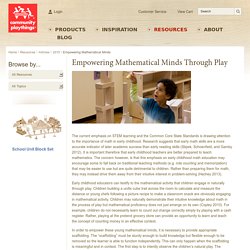
Research suggests that early math skills are a more accurate indicator of later academic success than early reading skills (Stipek, Schoenfield, and Gamby 2012). It is important therefore that early childhood teachers are better prepared to teach mathematics. The concern however, is that this emphasis on early childhood math education may encourage some to fall back on traditional teaching methods (e.g. rote counting and memorization) that may be easier to use but are quite detrimental to children. Rather than preparing them for math, they may instead drive them away from their intuitive interest in problem-solving (Hachey 2013). Early childhood educators can testify to the mathematical activity that children engage in naturally through play. In order to empower these young mathematical minds, it is necessary to provide appropriate scaffolding.
Doc-0s-1o-docs.googleusercontent. Doc-08-1o-docs.googleusercontent. Doc-0o-1o-docs.googleusercontent. Www.naturalcuriosity.ca/pdf/NaturalCuriosityManual.pdf. Documentation: Transforming Our Perspective. Sp_Intentional_Teaching.pdf. Understanding the use of Observations,Reflection and Linking in Early Childhood Settings. I still remember learning about observations when I was studying my Diploma over 20 years ago now.
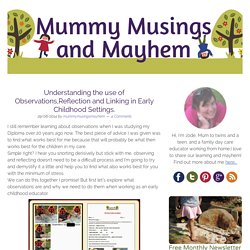
The best piece of advice I was given was to find what works best for me because that will probably be what then works best for the children in my care. Simple right? I hear you snorting derisively but stick with me, observing and reflecting doesn’t need to be a difficult process and I’m going to try and demystify it a little and help you to find what also works best for you with the minimum of stress. We can do this together I promise! Qklg_pd_mod4_exp2_doc_observ.pdf. Raise Learning - Early childhood services (inc. programming and planning for the EYLF and the National Quality Standards) Anecdotal Observations An anecdote is a "short account of a particular incident or event of an interesting or amusing nature", often biographical ("Anecdote",nd).
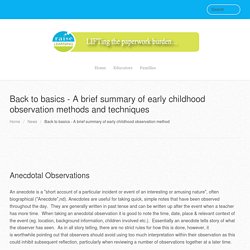
Anecdotes are useful for taking quick, simple notes that have been observed throughout the day. They are generally written in past tense and can be written up after the event when a teacher has more time. When taking an anecdotal observation it is good to note the time, date, place & relevant context of the event (eg. location, background information, children involved etc.). Essentially an anecdote tells story of what the observer has seen. Transpdbooklet.pdf. Let the Kids Learn Through Play. Photo TWENTY years ago, kids in preschool, kindergarten and even first and second grade spent much of their time playing: building with blocks, drawing or creating imaginary worlds, in their own heads or with classmates.
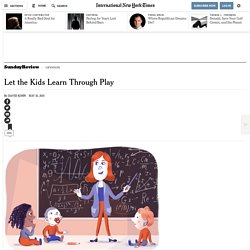
But increasingly, these activities are being abandoned for the teacher-led, didactic instruction typically used in higher grades. In many schools, formal education now starts at age 4 or 5. Without this early start, the thinking goes, kids risk falling behind in crucial subjects such as reading and math, and may never catch up.
The idea seems obvious: Starting sooner means learning more; the early bird catches the worm. But a growing group of scientists, education researchers and educators say there is little evidence that this approach improves long-term achievement; in fact, it may have the opposite effect, potentially slowing emotional and cognitive development, causing unnecessary stress and perhaps even souring kids’ desire to learn. Continue reading the main story. How we document – Albury Out of School Hours. This month, Cathy Northam, Director of Albury Out of School Hours (OOSH) writes about her team’s innovative approach to documentation, reminding us there are many ways to approach this responsibility.
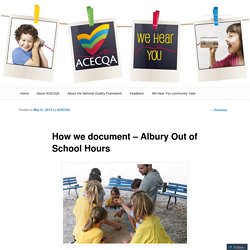
My colleagues and I had a light bulb moment when we sat down to review the documentation policy for our service. We felt the diverse and transient nature of out of school hours care required a different approach to the documentation framework used in long day care. We asked ourselves: What does documentation in OOSH look like? Is what we record relevant and how can we improve it? Once we stopped to think about the ‘how’ and ‘why’, we were able to identify a method of documentation that works for our children and their families. At Albury OOSH we have a strong focus on respecting children’s rights, particularly a child’s right to have an opinion and be heard, and a child’s right to privacy. So, how do we meet our NQF requirements and honour our children’s rights? More Than Pretty: Creative Arts as a Language of Learning. Children’s artwork can be truly beautiful.
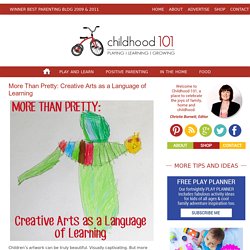
Visually captivating. But more than being pretty, or even interesting, it can tell a story. Look intently as they create and you will see the child’s story unfold. Quite often he story of a theme or subject, and always the story of the artiste – a window into their knowledge, thoughts and ideas, feelings and emotions. EarlyChildLearnEnv.